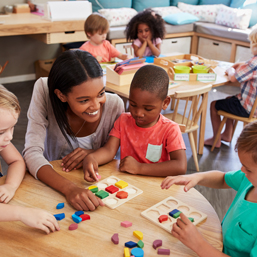-
Written by Maureen Khallad; Photo: Fotolia.com
There is so much more to preparing your preschooler than numbers and ABCs. One of the most important skills your preschooler needs are adequate fine motor skills. Fine motor skills involve movement of the smaller muscle groups in your child’s hands, fingers, and wrists. With the advent of screens, preschoolers are falling behind in fine motor skills as their hands become ‘paddle fingers’ for swiping screens.
There are several areas in fine motor skills that need to be developed:
- The palm of the hand. This skill allows your child’s palms to curl inward. Strong palmar skills coordinate the movement of your child’s fingers that are needed for writing, unbuttoning clothes, and gripping.
- The wrist must be stable to move the fingers with strength and control.
- The side of the hand must be developed to use the thumb, index finger, and other fingers for grasping and holding tasks.
- As the hand muscles develop, a preschooler must be able to perform small movements with the hand where the tip of the thumb, index finger, and middle finger touch.
A preschooler must be able to coordinate both hands at the same time. By age four, your child should be able to:
- Turn a doorknob
- Independently wash their hands
- Correctly use a spoon and fork
- Zip and unzip their clothes
- Unbutton and button their clothes
- Place and remove lids from canisters
- Use scissors to cut paper
Trace shapes on paper
If you have determined that your child might be behind in one or more of these fine motor skills, there are many activities you can do at home in order to have your child ready for Kindergarten.
Here are some ideas:
- Your child should be able to dress themselves by age three. You need to allow time for your child to perform these tasks at drop-off and pick-up times. Your child will develop hand strength, increase eye-hand coordination, and balance.
- Get puzzles that are simple at first and increase difficulty as your child perfects their fine motor skills. Make it a family activity.
- Play board games that involve rolling dice. Use a small lipped tray to corral the enthusiastic rolling. Glue a felt square in the bottom of the tray, which will also help with runaway dice.
- Let your children set the table and pour their own drinks. Ditch the sippy cups. Your children will develop better eye-hand coordination without lids. Enlist their help with cleanup (it helps strengthen their midline skills as they wipe up using movements that coordinate their hands and strengthen their shoulders).
- Make cookies that require rolling and squeezing. Don’t want to bake? Make playdough and get them busy with squeezing and rolling the dough.
- Place rubber bands around cans of different sizes. This helps strengthen the palm as well as pincer grasp.
- Place objects in a container (cotton balls or craft balls are great to start with) and use tweezers to remove them (you can purchase large-size tweezers online).
- Give your child a big piece of bubble wrap to pop bubbles. Then increase difficulty and pop bubbles with a pair of large-size tweezers.
- Allow your child to climb and hang from monkey bars unaided. Stand back. Allow your child to test their own limits (within reason). Hanging from monkey bars strengthens those little hands.
- Reading books and turning pages strengthens the pincer grasp and should not be only a bedtime activity. At appointments, take books to entertain your child rather than using a screen.
Preschools are an excellent resource if your children are not developing adequate fine and gross motor skills. There is government funding available for children enrolled in a preschool program that have mild to moderate delays in development.
Maureen is the Director at The Think Sun Preschool Academy, located in Calgary at #10, 5555 Strathcona Hill SW. For more information, call 403-240-4466 or visit thethinksunpreschool.com.
